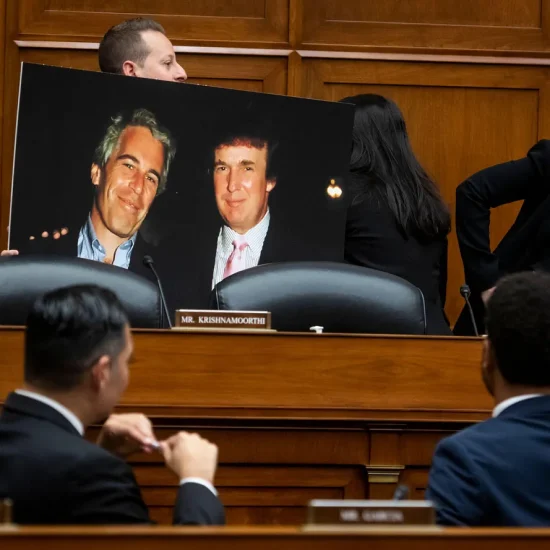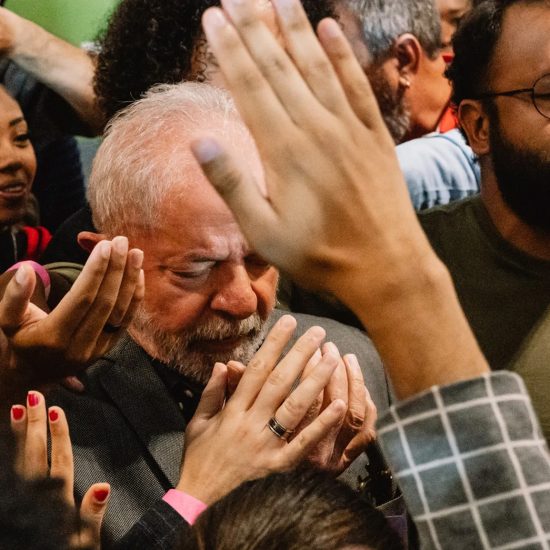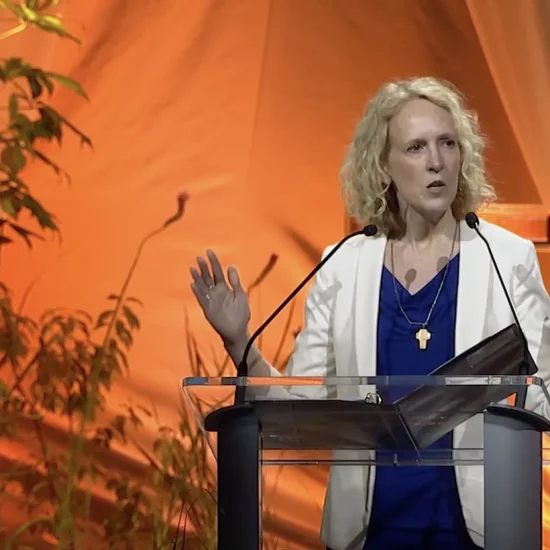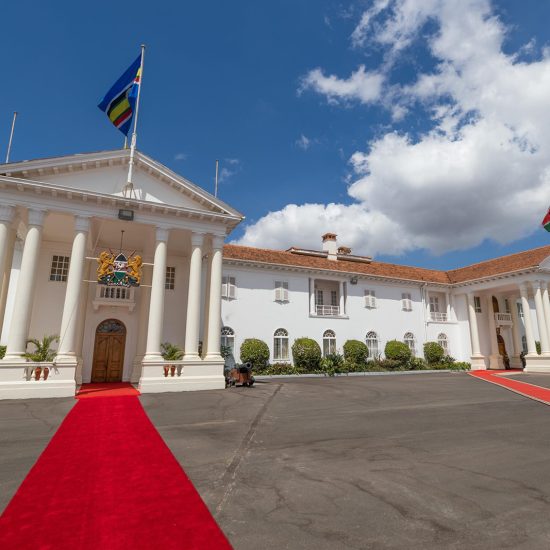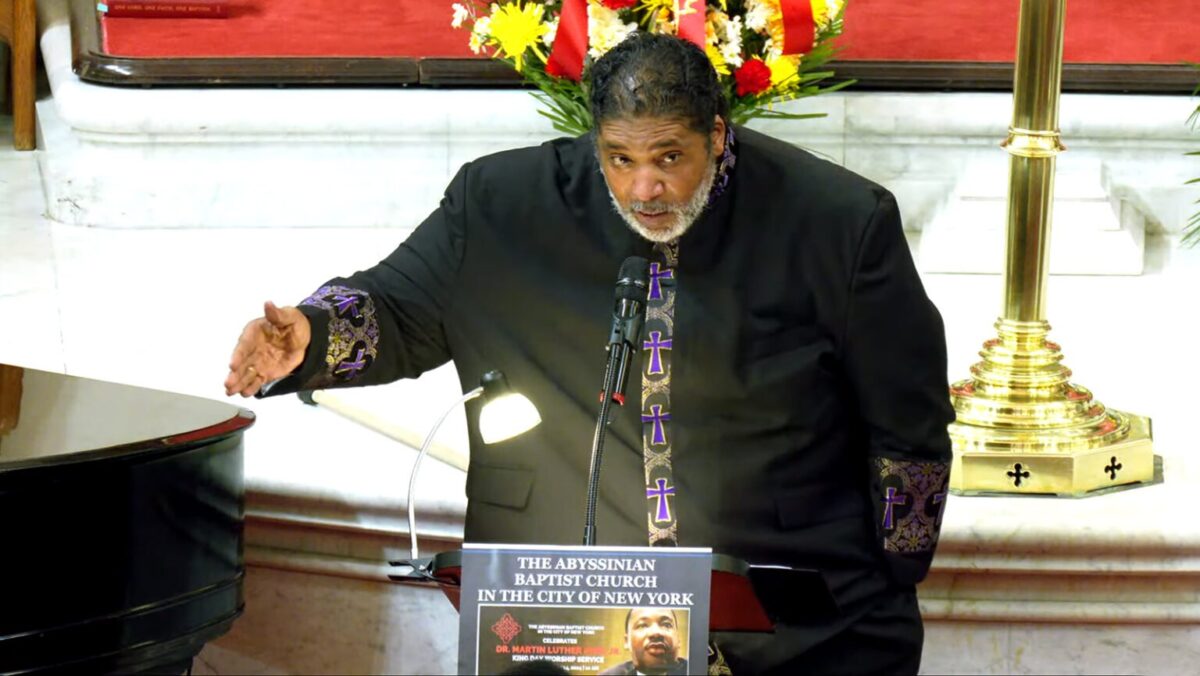
(RNS) — At the historic Abyssinian Baptist Church in Harlem, New York, the preacher is often aided in his delivery by blasts from the organ that emphasize his points. On Sunday (Jan. 14), the speaker hardly needed the help.
“We need a shaking in this country,” declared the Rev. William Barber, the Disciples of Christ pastor and civil rights organizer, to emphatic applause. “Until low-wage workers are paid, we need to shake some things up! Until everybody has affordable housing, we need to shake things up!” Barber told the packed congregation, bringing them to their feet.
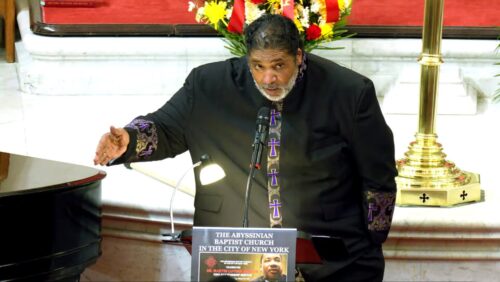
The Rev. William Barber II speaks at the historic Abyssinian Baptist Church in Harlem, New York, Sunday, Jan. 14, 2024. (Video screen grab)
His sermon at Abyssinian was part of a monthlong speaking tour Barber is undertaking to put poverty reduction on the agenda in this election year. It echoed the homily he delivered three years ago at a prayer service for President Biden’s inauguration, where Barber said a “third reconstruction” was needed to address ecological devastation, systemic racism, and poverty. He has since expressed disappointment that the White House has not pushed hard enough for results on poverty in particular.
This time around, he said, prioritizing poor and low-wage workers is nonnegotiable.
His intended audience is not only policymakers, but 15 million of the poor and low-wage voters he claims didn’t vote in 2020. “They could fundamentally shift electoral outcomes in this country,” said Barber, president of Repairers of the Breach and founding director for the Center for Public Theology and Public Policy at Yale Divinity School. Barber also co-chairs the Poor People’s Campaign, a revival of a project founded by the Rev. Martin Luther King Jr.
On March 2, the Poor People’s Campaign and Repairers of the Breach will host 30 rallies at state capitals across the nation, led by poor and economically vulnerable people.
Barber spoke to Religion News Service about how this campaign builds on King’s legacy and Jesus’ ministry and what he’s looking to hear from Biden going into 2024. This interview has been edited for length and clarity.
What inspired your speaking tour?
We keep going through these presidential elections, and not 30 minutes of a presidential debate is dedicated to poor and low-wage workers. Seventy percent of the country wants to raise the minimum wage to a living wage, which has not been raised since 2009. That’s 15 years. We’ve not fixed the Voting Rights Act since 2013, that’s almost 11 years.
If we’re serious about the legacy of Dr. King and the legacy of justice, we can’t simply remember “I have a dream” without remembering what he said about living wages and lifting up poor and low-wealth people. We can’t forget in 1965, when he said at the end of the Selma to Montgomery march that the greatest fear of the racist aristocracy in this country was for the mass of the Negros and the mass of poor white people to get together and form a political voting bloc that could fundamentally reshape the economic architecture of the country.
How are you hoping to connect with poor and low-wage voters?
We’ve worked since 2018 to build coordinating committees in 40-some states, made up of poor and low-wealth persons, religious leaders, and advocates. We’re building deep relationships with worker movements fighting to raise wages. Mass gatherings will create mass action and mass consciousness and will put a face on these issues. We had some 400 organizations join with us in 2022 when we had the first mass poor people and low-wage workers March on Washington, as well as major denominations and religious groups. We’re calling on all of them to reach the people in their immediate circles.
What’s your strategy for reaching conservative voters?
It’s not so much about partisanship, it’s about principle. Instead of looking at candidates through a partisan lens, we look at who is saying, “If we get power, we’re going to do living wages, health care, voting rights.”
I believe, as Dr. King and many others did, that there is this constituency out there that isn’t so much driven by labels. They are trying to survive in the midst of all of this opulence and greed, and all they want is a fair shot. All they want is a basic living wage, paid family leave, and health care. Poverty is killing over 800 people a day. It does not kill them based on their party.
How do you feel about President Biden’s record on poverty so far?
President Biden and Kamala Harris said, if we get elected, we’ll do voting rights and living wages. But the Congress failed, the Senate failed. His own party failed. If it had not been for eight (Democratic lawmakers’ votes) on living wages, and two Democrats on voting rights, today, 52 million people would have a minimum wage of $15 an hour, rather than $7.25, and we would have restored the Voting Rights Act.
I still believe the administration should not have done one vote and quit. Every session, there ought to be a vote on living wages and voting rights until we get it. Where is the deal for poor and low-wage folks?
What would you like to hear from the president heading into the election?
I would like to see him bring a group of poor and low-wage voters who look like America, some key religious leaders and economists to the White House for a summit with him and the vice president. We will not get a living wage, paid family leave, and health care until we put a face on it and show America who is being damaged. And we will not get it as long as we keep allowing folks to marginalize the issues of poverty and voting rights as minority issues. We must approach them as being fundamental American issues and a failure of our constitutional promises of equal protection under the law and promoting the general welfare. We want to hear that the more than 120 million low-wealth people in this country are not forgotten.
You’ve said what’s at stake is more than the poor, it’s our democracy.
If you want a functioning democracy, it can’t be an impoverished democracy. An impoverished democracy opens the door for the kind of hate and demagoguery we see coming out of the mouth of Trump, and not just Trump — his ideals are still running rampant through state houses and through Congress. When we march on these state capitals and in D.C., and when we push folks to the polls, we are not the insurrection, we are the resurrection. The worst thing we can do in a democracy is to be silent on the things that really matter.
What role does faith play in this?
We’re doing this as a matter of faith. All of the prophets lambasted society when they passed legislation that robbed the poor of their rights. Jesus started his ministry declaring good news to the poor, particularly those made poor by economic exploitation. Every major faith tradition calls us to challenge society and how we treat the poor and the least of these. We can’t allow religious nationalism, which is a form of heresy, to have the loudest and last say. As people of faith, this has to be our moment.

